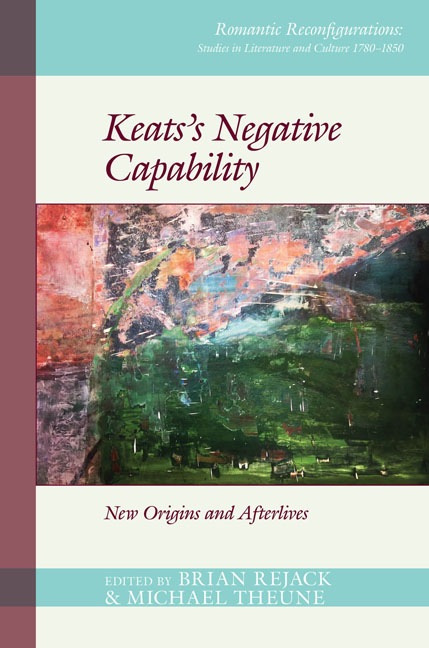Book contents
- Frontmatter
- Contents
- List of Figures
- Acknowledgments
- List of Abbreviations
- List of Contributors
- Preface
- Introduction: Disquisitions: Reading Negative Capability, 1817–2017
- Part I ‘swelling into reality’: New Contexts for Negative Capability
- Part II ‘examplified throughout’: Forms of Negatively Capable Reading
- Part III ‘pursued through Volumes’, Volume I: Negative Capability in Twentieth- and Twenty-First-Century American Poetry
- Part IV ‘pursued through Volumes’, Volume II: Adaptations, Appropriations, Mutations
- Afterword: Reading Keats's Negative Capability
- Bibliography
- Index
12 - ‘Darkling I listen’: Jorie Graham and Negative Capability
- Frontmatter
- Contents
- List of Figures
- Acknowledgments
- List of Abbreviations
- List of Contributors
- Preface
- Introduction: Disquisitions: Reading Negative Capability, 1817–2017
- Part I ‘swelling into reality’: New Contexts for Negative Capability
- Part II ‘examplified throughout’: Forms of Negatively Capable Reading
- Part III ‘pursued through Volumes’, Volume I: Negative Capability in Twentieth- and Twenty-First-Century American Poetry
- Part IV ‘pursued through Volumes’, Volume II: Adaptations, Appropriations, Mutations
- Afterword: Reading Keats's Negative Capability
- Bibliography
- Index
Summary
Jorie Graham has turned to Keats's notion of negative capability throughout her career. She takes Keats's departure from ‘consequitive reasoning’ and pivot toward a state ‘capable of being in uncertainties, Mysteries, doubts, without any irritable reaching after fact & reason’ as a template for charting how one opens the mind or soul to what she calls the world's rich silence in order to linger in it and inhabit it more fully (LJK, I: pp. 185, 193). In this essay I trace a history of her various attempts to spell out new ways the imagination might move forward in response to Keats's suggestive comments. Her focus on sensation and the body in developing her take on negative capability offers a window onto the new forms of attention and approach to the world that contemporary poets have developed, as well as the increasingly dark spiritual and linguistic crises that have driven those inventions. Graham arrives, in her four most recent full-length collections, at an extended articulation of these Keatsian issues, exploring how the body responds in the face of uncertainty and doubt, and how foregrounding that embodied situation creates a new form of listening crucial to fully inhabiting the world.
In an interview she did with Mark Wunderlich more than twenty years ago, for example, she notes that in order to preserve ‘my silence, my not-knowing (which is, of course one's greatest resource) … I need certain things to remain secret from my own conceptual intellect’. Preserving silence, she continues, ensures ‘that larger quotients of “not-knowing” are involved in that sensation we call “understanding”—as well as pleasure in that sensation (Keats would call it “negative capability”, of course)’. Keeping the conceptual intellect momentarily at bay, she argues, allows one to develop a notion of understanding that folds ‘not-knowing’ into knowing. She labels that openness to not-knowing ‘negative capability’. In a discussion with me in 2002 about Emily Dickinson's stanza ‘A Color stands abroad / On Solitary Fields / That Science cannot overtake / But Human nature feels’, from ‘A Light exists in Spring’, Graham extends this notion of stepping momentarily away from the conceptual intellect:
[Dickinson is] not trying to say, ‘You cannot overtake, you must feel.’
- Type
- Chapter
- Information
- Keats's Negative CapabilityNew Origins and Afterlives, pp. 184 - 200Publisher: Liverpool University PressPrint publication year: 2019



